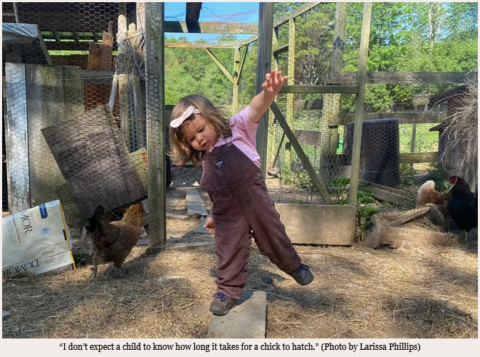In The Free Press, Larissa Phillips explains the kind of things city children (and their parents) learn when they stay at her family’s small farm for a week or a weekend:
Here are some things I have taught the kids who visit my farm: animals don’t care about your feelings, and sometimes we kill them to eat them. It doesn’t matter how desperately you want to find more eggs, the hens don’t lay on demand. Tomatoes aren’t ripe in June. The stalls aren’t going to clean themselves. Cuts, scrapes, and stings aren’t really a big deal. And there will always be poop.
I’m often struck by what city kids don’t know when they turn up at the education program I run for families on our 15-acre hobby farm — Honey Hollow Farm — in the Upper Hudson Valley. As a longtime urbanite, I get it. I lived in Brooklyn for 15 years before my husband and I moved upstate in 2010 with our two young children and one goal: start a farm. We kept horses and ponies for fun and raised poultry and sheep — and sometimes pigs — for food.
It was hard. Slaughtering animals we’d raised since they were babies was wrenching. Breeding and birthing those babies was dicey, too. But these experiences toughened us up. Working with animals and the land and the seasons was grounding — and the best antidote to anxiety I’d ever found. And most of it was fun.
I wanted to share this outlook with other families, even if it was just for a weekend. So at the start of the pandemic, I opened our guest cottage — and set up an informal curriculum to teach escaping urbanites what I’d learned.
I called it farm camp.
We host one family at a time, all through the year, in a renovated barn apartment overlooking the pony pasture. Most come for a week, some for a weekend. Every morning I’ll take a handful of kids, sometimes as young as three, through a two-hour, hands-on class on animal care, life, death, poop. All of them have to do some real farmwork.
There is a lot to learn. I don’t expect a child to know how long it takes for a chick to hatch, or why the roosters are always jumping on top of the hens. But I am often surprised by some of the straightforward things they don’t know how to do. Like how to pull a wagon around a corner, hold a shovel, climb over a gate, make a braid, or tie a knot.
Don’t get me wrong — I love offering explicit instructions on the most mundane tasks, then standing back and cheering when a kid does it independently. But two generations ago, these skills would have been common knowledge. For most of human history, the proportion of the world’s population living in cities was below 5 percent. It’s at 56 percent now. By the time today’s toddlers reach adulthood, it is expected that 80 percent of humans will live in urban areas.
Overprotected as they are, a lot of city kids are missing out on so many important encounters with material reality: with death or danger or manual labor. These encounters can be unpleasant, even painful. It’s understandable that we want to save our children from them. But they lose something essential when we do.
Most urbanites have a very sanitized — in fact, Disneyfied — view of rural life and especially life on a farm. It can be traumatic to discover that all the animals aren’t like you saw in the cutesy cartoons as a preschooler …




